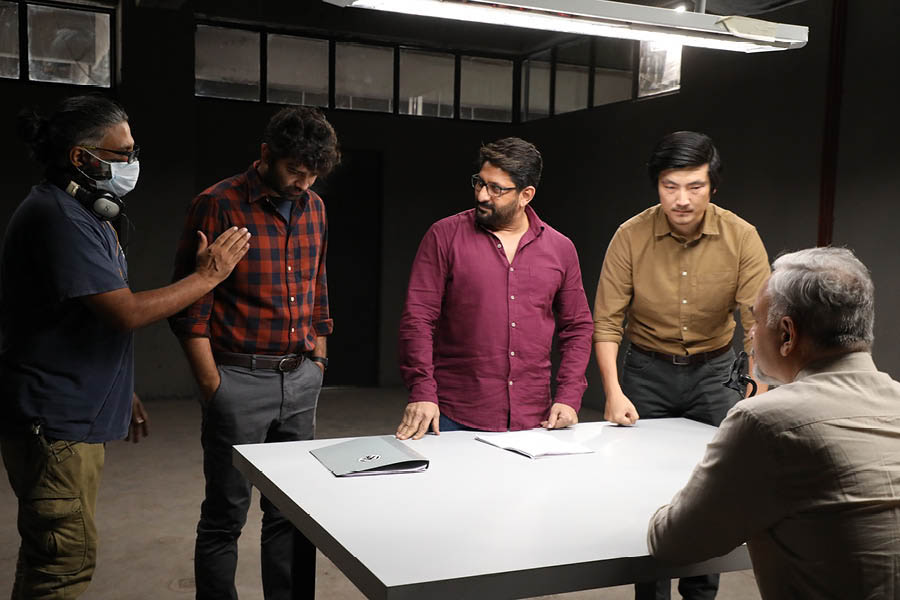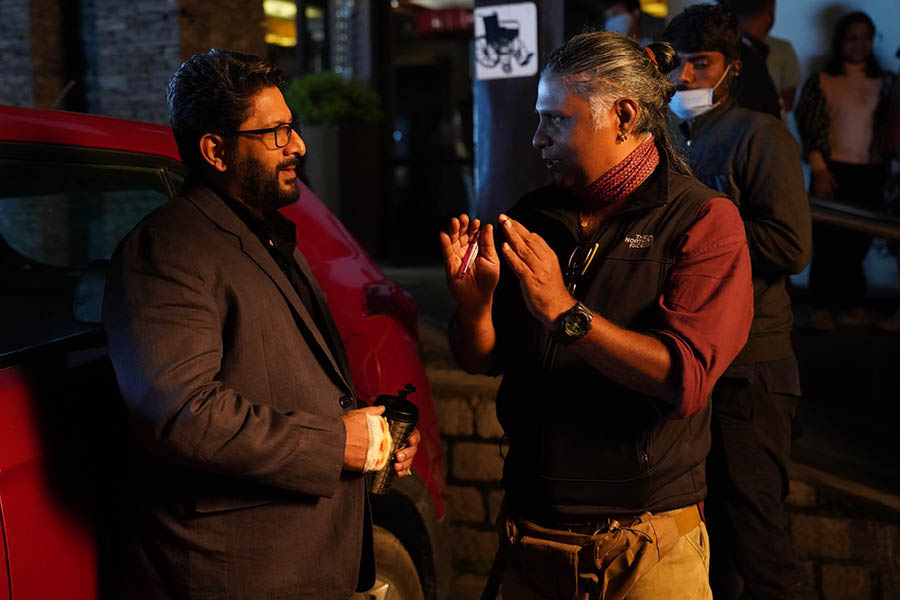Asur director Oni Sen is not in a hurry to make a third season of the show just yet. He would rather wait for an exceptional story to come his way that would justify dedicating a few years to it. Sen breaks down the process of making the two seasons of Asur and how the stakes have gone up each time.
The Telegraph Online: There was a long wait between the two seasons of Asur. How did the audience react during the long interim period?
Oni Sen: Yes, there was a bit of a long wait. Firstly, the writing took a while. Asur Season 1 was already a complex narrative, and to take that a few notches higher in terms of scale and narrative complexity while keeping the flow somewhat seamless was a tough task for Gaurav Shukla (the creator and the writer) and his team. Then the shoot itself took a while, partially because of the complexity of the script, and because of the second wave of Covid and the restrictions thereafter. We had to be extra careful during that time and that delayed us a bit. While we were working on the post-production, the impatience in the Asur audience was rising. The tone of the messages ranged from simple queries to emotional messages to emotional rebukes.
There must have been a lot of pressure to outperform the success of Asur Season 1…
Oni Sen: For any film or show where the first part becomes popular and appreciated, the second one always becomes challenging. The expectations from viewers are always very high. For Asur, the first season became very popular and a lot of viewers were eagerly awaiting the second season. We were very keen not to disappoint them. The narrative scope and the scale of Asur Season 2 is different from Season 1. It is bigger, more complex, and deals with a lot more characters. Therefore, yes, we were under some amount of pressure. I am so glad it was loved and appreciated by so many people.
Asur 1 belongs to a time when web shows didn’t drop every week and people were warming to OTT. In Season 2, a lot of new elements alongside new characters were added. What do you think is the novelty behind the show’s success?
Oni Sen: Asur 1 did release during the initial phase of the Covid lockdown, and a lot of viewers were looking for content to watch at home. But it was not the only reason why the series became extremely popular. Asur is a psychological thriller, rooted in the core of Indian mythology. The story intertwines the worlds of forensic science, mythology and human drama.
The beauty of the story is that the mythology is embedded in the narrative and not just a forceful juxtaposition. Season 2 adds one more dimension to the mix — technology. There’s a strong presence of technology in Indian mythology. The stories about flying chariots, magical weapons, mind control and many other fantastic things are nothing but technology.
In Season 2, we see a lot of technology along with all the other elements. But the core intent remains the same and that is to tell an engaging and engrossing story of human drama. And that, for me, is always the most important aspect of cinema. So, even though in Season 2, while the story grew beyond just three central characters, it remained intensely human. We also made sure that the peripheral characters were very closely linked to the primary characters and had their own story arcs.
The cast of Asur took the show to another level. It looks like a good team effort. How did you bind the characters across Season 1 and 2?
Oni Sen: Asur S1 ends at a point where all the primary characters are dealing with an immense sense of loss. Asur 2 starts from there. They start rising and fighting the battle on their way.
Asur 2 also talks about the shades of grey that lurk in all of us. Through this season, we see the characters indulge in this darkness at one point or the other. Even somebody as self-righteous as Nikhil (Barun Sobti), who would never do anything that was not by the book, takes a step in the finale which is totally against his grain but it’s what the characters have gone through that heightens the empathy of the audience. They will understand why DJ (Arshad Warsi) retreats into a monastery but then takes a completely unexpected turn, or why Naina (Anupriya Goenka) delves into darkness. A mother’s vengeance, after all, is the most unforgiving and dangerous force. Depicting these character paths and going through this journey have been the most challenging yet fulfilling aspects for me as a director.
S2 is also very relevant. We have explored the far-reaching impact of technology, the way it permeates privacy, our sense of safety, and how it has become a tool of mass surveillance. Also, what impact propaganda has on people’s minds and how it can push people towards the dark side.
All these factors, I guess, have struck a chord with the audience, and the response has been very heartening.
For me, a story is never only about the events. It’s about the journey of the characters who go through these events. What draws us into the narrative, makes us connect, believe and empathise is the human story. And I spend a lot of time and effort working on it in any work that I do. During the making of Asur S1 and S2, Gaurav and I had long discussions on this aspect. The trick was to find that balance between emotion and pace.
A lot of these were sorted during the writing process, and the rest while staging the scenes with the actors. I had an amazing bunch of actors who were extremely invested in the narrative and made our work much easier. Our editor Charu (Takkar) meticulously made sense of the complex narrative and found the right balance between the emotional journey and the narrative chaos of the show. Our music composer Dharam (Bhatt) managed to balance soul and energy beautifully in the soundscape. The mix of cello, strings and electronic sound added the right colour to the narrative.

Oni Sen with Barun Sobti, Arshad Warsi and Meiyang Chang on the sets of Asur S2
Did you watch other psychological thriller shows for reference?
Oni Sen: I do watch a lot of psychological thrillers and drama but the ones that stay with me are the ones that deal with the mind and emotions. Some of the most amazing films and shows — Godfather 2, True Detective, Seven — are clear examples. We are on a journey with the characters, feeling what they feel at every step, and that is what inspires me. I try to achieve it in all my work.
The other aspect is what is between the lines. Sometimes in an image, the negative space speaks more than the actual form. Similarly, in scenes, the pauses sometimes speak more than the words. It’s where the viewer gets a moment’s pause to feel and walk with the character’s mind.
Asur has religious and mythological elements. Tell us about the research work that went into it.
Oni Sen: There’s a difference between documented history and mythology. Mythology is often connected to religion and belief and is often open to interpretation. For Asur, Gaurav and his team worked very hard to make sure that no mythological aspect mentioned in the story was out of context. They were all well-researched and most importantly, there was a lot of care taken by the writing team to make sure nothing would hurt anyone’s beliefs and sentiments. And we all are immensely happy that somewhere it worked. The other aspect of Asur S2 is that one has tried to keep the threat very relevant to the current time. The dark side of technology — AI, deep fake and influencing opinions and minds through technology — is what affects us currently. And a lot of Asur S2 deals with it.
The audience is now asking for Asur 3 and they don’t want to wait too long. Is the team toying with the idea?
Oni Sen: Well, Gaurav (Shukla, writer and creator) and I are very clear that we will do Season 3 only if we get a fantastic idea. After S1, we all knew that a Season 2 was inevitable. But just because this season is a massive hit, it doesn’t mean we must continue. I think another season will come only when we find a story that is exceptional and worth dedicating a couple of years of our life to.
Asur is available for free streaming on JioCinema. Do you think content should be available free of cost in India?
Oni Sen: This is a tricky question. There are two sides to it. Making something free surely increases the reach of any content. It encourages a lot more people to watch it. However, there is a flip side to it. Creating good content needs resources, and if the producers and telecasters do not get a financial return, they might not be encouraged to fund projects that are ambitious and need substantial resources. So, I guess one needs to find a balance.
Tell us about your Kolkata connection.
Oni Sen: Kolkata and I share a deep connection. I was born and brought up in the city. Though I moved out years back, I still consider Kolkata ‘home’. A lot of my love for storytelling comes from my grandmother who used to tell us stories. My childhood in Kolkata was all about stories, cinema, music, football and drawing. My journey started from the National Institute of Design, Ahmedabad, and then to Mumbai in search of cinema. It has been a while but Kolkata remains in me.
What else is keeping you busy?
Oni Sen: There are a few projects that I am currently working on, of which two have been developed already. One is being tweaked a bit, and the other is in the process of being pitched.










